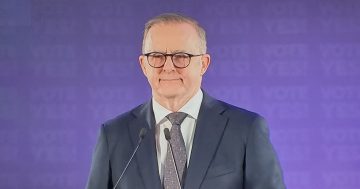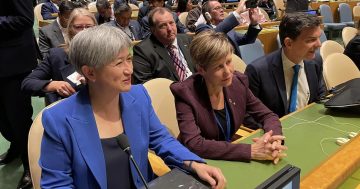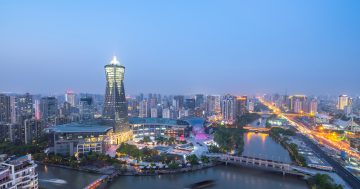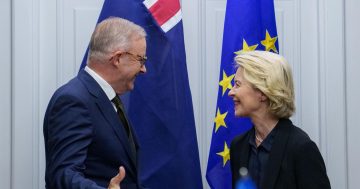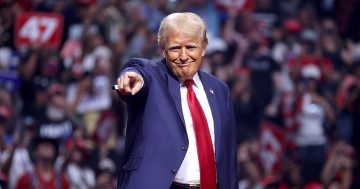Ian Burrows and Beverley O’Connor* say Donald Trump’s trade war with China might not be helping the US, but there will be other winners.

Photo: Julius Silver
Most agree that the trade war has so far not been a winning strategy for either the US or China.
The ongoing dispute has rocked markets and sparked fears the global economy could be derailed.
But despite all the losers, there are some winners.
Parag Khanna, a leading global strategy adviser whose TED Talks have been watched by millions of people, has been following the trade war closely.
“The winner of this trade war is undeniably ASEAN [the Association of Southeast Asian Nations],” he told The World.
“South-East Asia wins the trade war between the US and China because so much more outsourcing and diversion of investment is now going to ASEAN that is not going into China.”
Mr Khanna has a PhD from the London School of Economics and has just published his sixth book, titled The Future Is Asian.
He said the trade war was bringing Asian countries closer together.
“For example, Korean [and] Japanese companies that make semiconductors are now going to displace the American ones that have been hit by reciprocal tariffs from the Chinese market,” he said.
Mr Khanna said the winners’ list also extended beyond Asia.
“Europe is also a winner,” he said.
“Look at the major deal that Airbus signed with China during Xi Jinping’s visit to France.”
“That is not a coincidence, that is not an accident.”
“China decided to tip the scales in Airbus’s favour against Boeing as a result of this trade war.”
Time to start ‘thinking the unthinkable’
But while Mr Khanna argued a number of factors meant the twenty-first century belongs to Asia, another prominent thinker on US foreign policy said it was time to start “thinking the unthinkable” and wind back economic ties with China.
Jonathan Ward is a former consultant to the US Government and has just released a book titled China’s Vision of Victory.
Mr Ward said President, Donald Trump’s Administration, which recently raised duties on $200 billion of Chinese imports from 10 per cent to 25 per cent, was beginning a process not seen since the establishment of diplomatic ties between the two countries.
“What you have today is, for the first time really in 40 years, the American Government is rethinking its position on the China relationship,” Mr Ward told The World.
“For the last 30 or 40 years we essentially had this idea of ‘engage, but hedge’ — this was our China strategy.”
“We would engage China economically and we would hedge militarily, meaning we would be able to defend militarily and [maintain] the Pacific order regardless of the economic gains that have happened in China.”
“Now, this strategy has essentially failed because China is reinvesting its economic gains into military power.”
“It’s taken a confrontational approach to its region, to the United States.”
“It seeks essentially to unseat the United States as the world’s leading superpower.”
Mr Khanna added that Mr Trump’s strategy was not doing the US many favours.
“The trade war is having a much more negative impact on the United States than the administration would lead us to believe and it’s benefiting China’s more significant trading partners, which are Europe and other Asian countries and neighbours,” he said.
“You can’t on the one hand have a sort of one-sided trade war with China without taking into account the reciprocal tariffs, without taking into account the fact that even your allies, like Europe and Japan, are actually trying to undercut you and compete with you commercially.”
“So much of Trump’s Asia policy, including his China policy, is quite misguided and I think we’re seeing the evidence of that every day.”
Calls for democracies to band together to stop China
Mr Ward, who recently founded the Atlas Organisation — a consultancy that advises on China, India and their strategic interests — said he wanted to see democratic countries working more closely together to stop China’s rise.
“What we need to do is rebuild the economic ties among the democracies of the Indo-Pacific; we should be building ties across the democratic world,” he said.
“In an US$80 trillion world economy, the world’s democracies represent 65 per cent of that world economy.”
“The US is about 25 per cent at US$20 trillion.”
“China is only about 13 per cent.”
“So, we really have a lot we can do with each other.”
Mr Ward said there were a number of risks that came with a future world dominated by China.
“I think what you have to ask yourself is ‘What do we really want the twenty-first century to look like?’,” he said.
“On one hand you have a US system which in essence is a series of parliamentary democracies across the globe interacting consensually to make international policy, and on the other hand you have the rise of history’s largest and, at this point, most powerful dictatorship.”
“It’s internal practices, whether you look at Tibet or Xinjiang, it’s external [practices] through military ambitions, whether you look at the South or East China Seas.”
“All of this represents a very different system from what America has put in place over the last 70 years.”
* Ian Burrows is a producer, reporter and presenter in the ABC’s Asia Pacific Newsroom. Beverley O’Connor is a presenter for ABC’s The World. She tweets at @bevvo14.
This article first appeared at www.abc.net.au.


